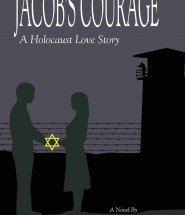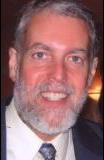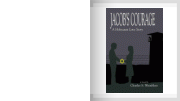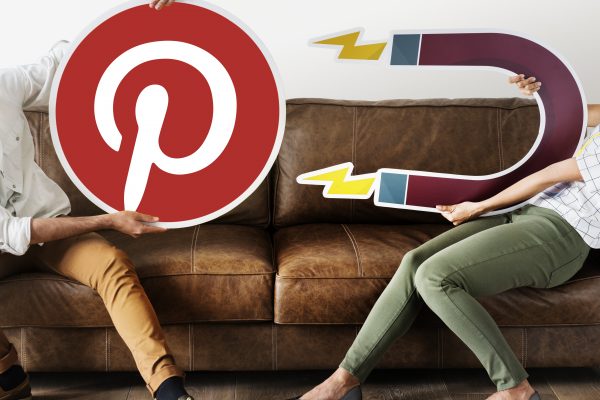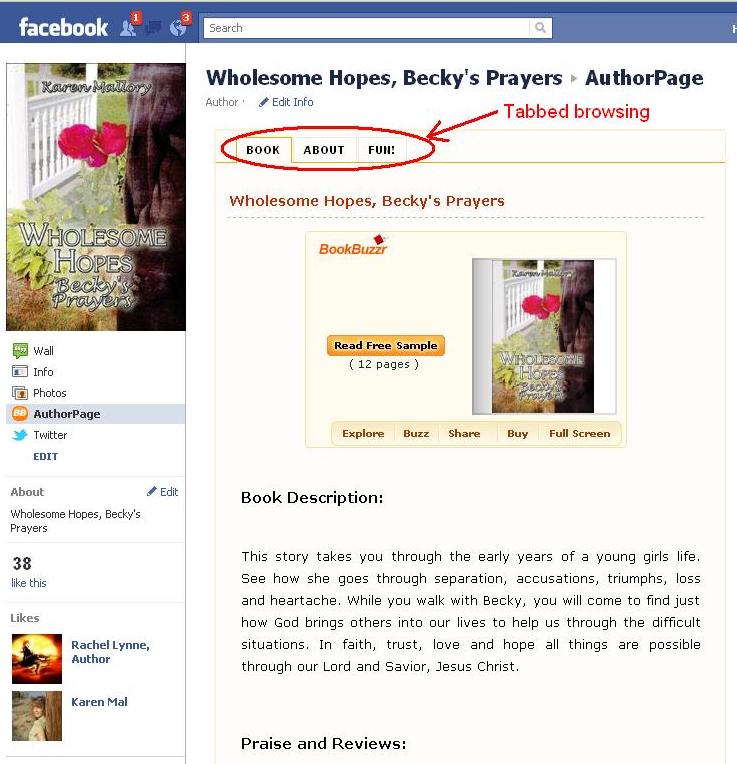Charles S. Weinblatt was born in Toledo, Ohio in 1952. He is a retired University of Toledo administrator. Weinblatt is the author of “Jacob’s Courage” and “Job Seeking Skills for Students.” His biography appears in the Marquis Who’s Who in America and Who’s Who in American Education. Weinblatt was a frequent Toledo television news guest. He received the 2004 Douglas Frasier Swift Award. Weinblatt writes novels, short stories and published articles. He lives in Ohio.
BookBuzzr interviewed Charles Weinblatt who is the author of the book ‘Jacob’s Courage: A Holocaust Love Story.‘
1. Welcome to BookBuzzr blog, Charles. Can you tell us a little bit about yourself?
I was born in Toledo, Ohio in 1952. I am a retired University of Toledo administrator. My biography appears in the Marquis Who’s Who in America and Who’s Who in American Education. I was a frequent Toledo television news guest, providing business, economic and labor-management insight. I received the 2004 United Auto Workers’ Douglas Frasier Swift Award, for meritorious community service.
My career spanned 31 years, the first 15 years devoted to psychiatric and vocational rehabilitation counseling, followed by 16 years at The University of Toledo. During my last nine years at the University, I created and led my own division, The Division of Organization Development. This division was a part of University College. My division helped businesses improve their performance with various assessment systems, customized training and organization change interventions. In addition to helping North American businesses with performance improvement, my division generated consulting opportunities for faculty and earned considerable revenue for the University.
I continue to live in Ohio with my wife, who is a retired special education teacher. We have two adult children.
2. How and why did you become a writer?.
Writing is probably my only real skill. I’m terrible with math and dangerous with tools. But, I’m not bad with words. So, I write. I’ve been writing as long as I can remember. As a child, I wrote short stories and even some poetry. After college, my focus turned to my family and then my career. Writing was pushed away for about three decades. Yet, the interest never departed and I was happy to return to it in earnest in retirement.
I had to retire at age 51 due to disability (degenerative disc disease). Since I retired at a fairly young age, I decided that I should remain as busy and productive as possible. I decided to pursue writing. I had already been published for non-fiction in 1986. This was a textbook called Job Seeking Skills for Students (Kendall-Hunt Publishing Company). After my University career, I turned to fiction. Three years later, my Holocaust novel, Jacob’s Courage (Mazo Publishers), was published.
3. What kind of research did you do for this book?
My disability prevents me from researching books via the most traditional means, including travel to important global locations and interviewing relevant people. Nor can I research at libraries or institutions, since I am unable to sit upright for more than a few minutes at a time. I am therefore limited to purchasing books, researching via the Internet and interviewing people through e-mail, Skype, telephone conversations and letters.
For Jacob’s Courage, I interviewed Holocaust survivors, purchased some excellent non-fiction books and memoirs about the Holocaust and I devoted considerable research on the Internet. It would have been physically impossible for me to conduct sufficient research for a non-fiction book. However, I was able to collect enough data for a novel.
The Holocaust has also been of great interest to me for many years. Almost two generations of my maternal extended family perished in the Shoah (Holocaust). I’ve probably seen every movie about the Holocaust and I have literally hundreds of detailed links to historical web sites. The Internet is a magnificent source for Holocaust information. Dig deep enough at locations such as the US Archives, Yad Vashem, The US Holocaust Museum and many other significant international resources and you will discover plentiful, comprehensive records about the Nazi genocide of the Jews. Accessible information from sources as varied as anecdotal transcriptions, vetted historical research, captured German war documents and concentration camp records prove that the events of the Holocaust are facts.
I am also fairly well-read on the subject. This includes non-fiction, such as Holocaust, by Dwork & van Pelt and 48 Hours of Kristallnacht by Bard. I’ve also devoured memoirs, such as The Long Walk by Treeson, Night by Wiesel and 1000 to 1 Odds by Kubicek. I’ve also enjoyed reading other Holocaust novels, including the Winds of War and War & Remembrance by Wouk. There are too many others to enumerate here.
4. Do you have a specific place or time that you write?
I have one physical place for writing. After four failed spine surgeries, I’m forced to remain horizontal virtually all of the time. We have a large, open home with cathedral ceilings and skylights. One such room faces a densely-wooded ravine, filled with beautiful flora and fauna. It is an idyllic setting. This room, underneath sun, sky and nature allows me to relax and focus on creativity. My most productive time is afternoons. But, I do not force myself to write. Instead, I try to find at least some time each day to add to whatever I am currently writing. Sometimes, I’m in the groove and I want to write forever. Other times, my pain prevents research or writing.
5. What were some of the biggest challenges you faced writing ‘Jacob’s Courage: A Holocaust Love Story’?
Anyone who lost relatives in the Holocaust might find it difficult to write about it. I have known for most of my life that some of my maternal ancestors were victims of the Holocaust. When I was still researching for Jacob’s Courage, my mother (currently age 100) received a package of information from a cousin in New York. This data described in detail how virtually two generations of my mother’s family were murdered by Nazis. My maternal grandfather had six siblings. None of them and just one of their children survived the Nazi extermination of Jews. It is painful to recognize that they were murdered because of their religion. I often wonder what those lost relatives might have accomplished with a full and productive life. What could they and their progeny have contributed to society? Could one of them have discovered a cure for cancer or a solution to global warming?
All genocides are deplorable. It is painful to know that one’s innocent ancestors were murdered because of their faith. So, there was a significant emotional challenge, driving me to tell a story similar to theirs.
Although my Holocaust book is fiction, I wanted my characters to experience reality. I created ordinary people and dropped them into specific historical circumstances, allowing them to accomplish extraordinary feats. My challenge was to understand the history of the Holocaust and to place my fictional characters into those events. This required me to use selected historical characters with the greatest possible accuracy. Many of the cities, towns and even street names were accurate; the names of Czech partisans, SS officers and Nazi leaders were used. This forced me to learn as much as possible about events in those regions at that time.
6. What’s the most interesting comment you have received about your book?
About six months after Jacob’s Courage was published, I received a telephone call from a Holocaust survivor in Florida. This man told me that he had read Jacob’s Courage and he asked me where I had been imprisoned at Auschwitz. When I told him that I had not been at Auschwitz (had not been born yet), he became indignant. He was very angry with me. The man said that I could not have described conditions at Auschwitz with such detail without having been there. After two or three more telephone calls, he came to accept that I had not been there, but that I had carefully researched events at Auschwitz. His comments confirmed that my book’s historical accuracy for Auschwitz was authentic.
Recently, my book was reviewed by a survivor of the concentration camp Theresienstadt. She also mentioned that my description of camp conditions was spot on. I felt relieved to know that my descriptions of life in Nazi that concentration camp was largely accurate. Although a novel is not required to possess such accuracy, the author can only hope that their description is correct.
7. Please tell us where readers can find you on various networking sites?
I reside at many of the most common Internet sites, including:
http://www.facebook.com/chuck.weinblatt?ref=profile
http://twitter.com/Chuck_Weinblatt
http://cweinblatt.blogspot.com/ (Essays)
http://en.wikipedia.org/wiki/User:Charles_Weinblatt
http://www.linkedin.com/in/cweinblatt
http://www.myspace.com/cweinbl
http://www.jacobscourageaholocaustlovestory.blogspot.com/
http://cweinblatt.wordpress.com/
http://www.filedby.com/author/charles_weinblatt/1888145/
http://www.anobii.com/cweinblatt/books
http://www.authonomy.com/Profile.aspx
http://publishedauthors.ning.com/profile/CharlesWeinblatt
http://bizymoms.com/books/jacobs_courage/index.html
http://www.freado.com/users/4099/Charles-Weinblatt
http://www.goodreads.com/author/show/1315235.Charles_S_Weinblatt
http://www.librarything.com/home/Charles_Weinblatt
http://www.shelfari.com/o1514433881/shelf
http://cweinbl.webs.com/
http://tiny.cc/x7n90 (Amazon)
8. Briefly share with us what you do to market your book?
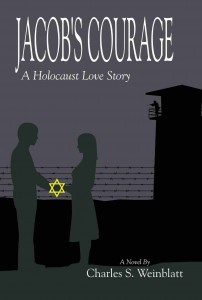
The world of book marketing is undergoing considerable change. People who formerly explored the world of books and purchased them at their local brick & mortar bookstore increasingly do this now on the Internet. Here we find web sites and blogs that can be used to attract the public to one’s book and accomplish the sale with a few more mouse clicks. The author can solicit reviews, articles and sales by creating several attractive and concise web pages and blogs and by implementing an effective e-mail marketing campaign, all from their own computer – and it is virtually cost free. Since publishers are still required to edit, print, distribute and market in traditional ways, and since they have fewer staff due to lower margins, it falls upon the author to accomplish many new tasks related to electronic marketing and sales. I explained all of this in my blog here http://cweinblatt.wordpress.com/
Marketing your book is time consuming and sometimes frustrating. But do not count on your publisher to accomplish everything, particularly if you are a new author. Be willing to implement your own marketing with web sites, blogs and e-mail. The harder your effort, the larger your royalty checks will be.
A good agent can vastly increase sales, via enhanced marketing opportunities. They might have connections for foreign and translation rights, improved distribution, screenplay, film and documentary leads. From that perspective it’s a useful concept. Literary agents don’t often take a chance on an unknown author, even if your book is already in print. To play at this game, you’ll need to develop a winning agent query.
There are many ways to help market a book. This includes contacting local bookstores and other retail outlets where your book can be sold. You should also request book signings at local retailers. Organize a book tour. Solicit reviews from the most compelling sources available (this can be difficult if your book is self-published). Obtain newspaper and magazine articles about your book. Conduct public speaking events. Blog and write on others’ blogs. Create e-mail and fax-blasts. Write articles and publish them on the Internet. Publish your interviews and book reviews. Write opinion or editorial letters to newspapers and magazines. Each time, sign off with the title and web site of your book. Develop and market a video book trailer. Create a Wikipedia page. Fabricate web pages and blogs for your book at sites such as Goodreads, Facebook, MySpace, Zing, and Author’s Den, Bookbuzzr, WeRead, Scribid, Ning and many others. Tweet about your book daily on Twitter.
Marketing is time consuming and often frustrating. Do not count on your publisher to do everything, particularly if you are a new author. You’ll need to create your own author platform. Trade-published authors can access assistance from their publisher. Self-published authors must accomplish all marketing tasks on their own.
An author platform is the collection of web pages, blogs, published articles, objects, events, venues, reviews, interviews, speaking engagements, author experience, talent, pictures, book trailers and videos that pertain to the book or the author. In other words, when someone decides to Google your name, dozens of such links should appear. Intelligent marketers develop strategy before the product or service is ready for sale. Consider your target audience and begin from there. One you have a book cover and some excellent reviews, plaster them all over the Internet. Work with an art-designer to develop a video book trailer. Having a significant author platform is more important than you might think. Your publisher should contract with global distributors to place your book on Amazon, with international retailers and on retail store shelves. Be willing to conduct viral, electronic and web page marketing on your own. Use social networking sites. The harder your effort, the larger your author platform will be (and higher royalty checks may follow).
If you self-publish, consider selling your book via Internet retailers and distributors, such as Smashwords and Lebrary. These entrepreneurs will take your formatted manuscript, jacket and your marketing words out to the e-reading public. Smashwords allows their Premium members to have their books sold on the new iPad, the iPhone and many other leading edge e-reading devices.
Trade publishers are also beginning to sell many of their books electronically. Jacob’s Courage, was one of the first e-books offered by my publisher and it was one of the first Holocaust Kindle books. As the reading public changes their mode of reading, you will want your publisher to have electronic sales opportunities available, in addition to the print version. Remember that each new version of your book (such as an e-book) requires its own unique ISBN number.
Today, you’ll want your book available in HTML and all other publishing formats, especially “E-PUB,” which can be translated into the format for cell phones, the iPad, iPhone, Blackberry, Stanza, Kindle, Sony and other electronic reading devices. If you are trade-published, ask your publisher to accomplish the formatting for you. If you are self-published, you have some work to do on formatting. Keep in mind that with each passing day, more people will make purchasing decisions based upon the electronic reading device that they own.
Being published is not simple or easy. But, if you have the talent and your book is marketable, you can be published. Marketing is not enjoyable; but, it is necessary.
9. So what is next? Will we see another novel?
I completed a children’s book in November 2009. It’s about two ducks (brothers) who escape from their pond at a young age due to boredom. Instead of an interesting experience, it becomes terrifying. The young ducks must survive attacks by a feral cat and a slumbering bear, as well as a wild hailstorm; and they had to cross a terrifying expressway, to reach the safety of their pond and their mother. Of course, the moral is, “There’s no place like home.”
I am also nearly finished with a science-fiction novel, which has been a thrill to write. Science fiction and horror fiction are my preferred genres. This one is about the adventures of an American astronaut caught up in the mother of all solar flares (solar mass ejection). He is transformed into the body of a cloned alien on a planet in a faraway solar system. The astronaut must learn how to deal with a new body, language, culture and relationships. Eventually, he becomes a flight leader in the armed forces of his new society, which in many ways resembles his old United States. His plane is shot down over enemy territory. Captured by the enemy, he discovers that they look and sound like humans, while he is stuck inside the body of an alien clone. If it sounds ironic – it is.
No doubt you will see another novel similar to Jacob’s Courage. The question is, will it be a sequel or will it be another Holocaust novel? I have a sequel in mind that begins in 1946, in the Palestinian Territories. Since few countries would take in Jewish refugees after the Holocaust, many survivors eventually found a way to enter the Holy Land. Yet, another Holocaust book also seems enticing. There are six million stories to tell. I’ve only told two of them. Stay tuned!
BookBuzzr thanks Charles Weinblatt for such an excellent interview. Connect with Charles Weinblatt on fReado.

